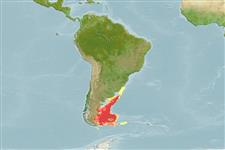Ελασμοβράγχιοι (καρχαρίες και σαλάχια) (sharks and rays) >
Rajiformes (Skates and rays) >
Arhynchobatidae (Softnose skates)
Etymology: Bathyraja: Greek, bathys = deep + Latin, raja, -ae = a ray (Raja sp) (Ref. 45335).
More on author: Norman.
Environment: milieu / climate zone / depth range / distribution range
Οικολογία
Θαλασσινό(ά) βενθικό(ς). Temperate
Southwest Atlantic: Uruguay to Argentina (Ref. 58839). Southeast Pacific: Chile.
Μέγεθος / Βάρος / Age
Maturity: Lm ? range ? - ? cm
Oviparous (Ref. 50449). Eggs have horn-like projections on the shell (Ref. 205).
Life cycle and mating behavior
Maturities | Αναπαραγωγή | Spawnings | Egg(s) | Fecundities | Προνύμφες
Oviparous, paired eggs are laid. Embryos feed solely on yolk (Ref. 50449). Eggs have horn-like projections on the shell (Ref. 205).
McEachran, J.D. and K.A. Dunn, 1998. Phylogenetic analysis of skates, a morphologically conservative clade of elasmobranchs (Chondrichthyes: Rajidae). Copeia 1998(2):271-290. (Ref. 27314)
IUCN Red List Status (Ref. 130435)
Threat to humans
Harmless
Human uses
αλιεία: Εμπορικό(ά)
Εργαλεία
Special reports
Download XML
Διαδικτυακές πηγές
Estimates based on models
Preferred temperature (Ref.
123201): 3.3 - 6.4, mean 5.4 °C (based on 116 cells).
Phylogenetic diversity index (Ref.
82804): PD
50 = 0.5000 [Uniqueness, from 0.5 = low to 2.0 = high].
Bayesian length-weight: a=0.00513 (0.00253 - 0.01042), b=3.12 (2.95 - 3.29), in cm total length, based on LWR estimates for this Genus-body shape (Ref.
93245).
Τροφικό Επίπεδο (Ref.
69278): 3.2 ±0.38 se; based on food items.
Ελαστικότητα (Ref.
120179): Χαμηλό, ελάχιστος χρόνος για διπλασιασμό πληθυσμού 4,5 - 14 έτη (Fec assumed to be <100).
Fishing Vulnerability (Ref.
59153): High to very high vulnerability (66 of 100).
Nutrients (Ref.
124155): Calcium = 35.8 [4.9, 1,067.6] mg/100g; Iron = 0.421 [0.037, 5.886] mg/100g; Protein = 12.9 [10.9, 14.8] %; Omega3 = 1.26 [0.27, 5.59] g/100g; Selenium = 4.89 [0.54, 35.66] μg/100g; VitaminA = 294 [9, 7,487] μg/100g; Zinc = 1.6 [0.1, 18.3] mg/100g (wet weight); based on
nutrient studies.
